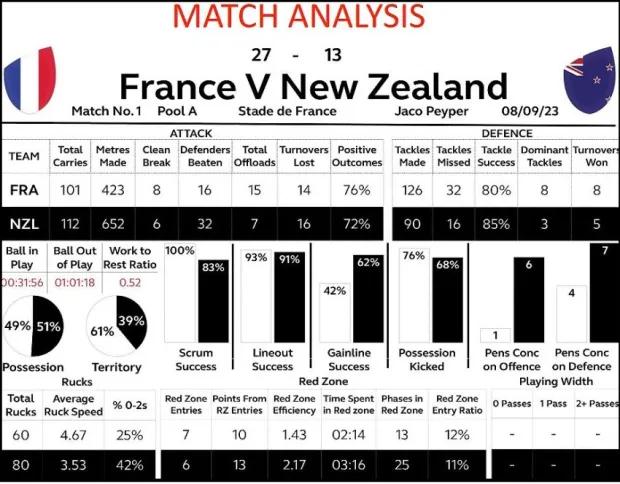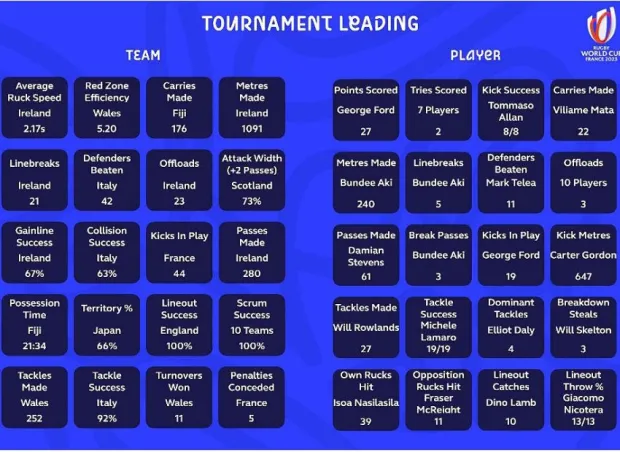The one key stat that explains why France won
STATISTICAL ANALYSES: Hosts France made a clear statement of intent, with a very ‘miserly’ approach to the game.
France beat New Zealand 27-13 in front of a raucous crowd at Stade de France last Friday to kick-start the tournament.
Key to France’s success was the fact that they conceded the fewest penalties in the opening round of the tournament – with just five.
In start contrast, the All Blacks gave away 13 penalties on attack alone.
New Zealand were ranked fourth overall for defenders beaten with 32 – wing Mark Talea topping individual rankings with 11 defenders beaten – and fifth for metres made with 629, but they were unable to translate those numbers on the scoreboard.
“We looked dangerous when we had the ball, but we let ourselves down, and [were] not being patient and clinical with our skillset,” said stand-in New Zealand captain Ardie Savea after the game.
France made five more offloads than their highest total during their four games in the World Cup warm-up matches.
France made eight dominant tackles to New Zealand’s three, representing New Zealand’s lowest dominant tackle count across the warm-up matches.
The game also produced highest ball in play time that France endured in all their warm-up matches – nearly 32 minutes.
France dominated territory with 61 percent, 14 percent higher than their average during the warm-up matches and the most of any single game.
A big factor of that territory was kicks.
France kicked on 76 percent of their possession – they didn’t reach higher than 61 percent during the warm-up matches. Their 44 kicks in total was also their highest across that period with an average previously of 25 per game.
Their discipline was the real key – with only five penalties conceded, half their best tally across the warm-up matches.
France conceded only one penalty in attack, proving efficiency with the ball – with only two teams across all the warm-up matches conceded fewer.
In contrast, the All Blacks conceded one penalty fewer than their loss against South Africa, but it included the most penalties they have conceded in attack.

* Elsewhere, Italy ran out 52-8 winners against Namibia on Saturday. It was a harsh result for the African side, who were in fact fourth-best of all the teams for collision dominance across the first round with 47 percent, and second for turnovers with nine.
Argentina looked favourites to beat England after Tom Curry’s red card in Marseille on Saturday, but the Pumas were ultimately unable to make inroads with the ball in hand. Michael Cheika’s side only reached England’s 22 four times during their 27-10 loss.
“Pretty much everything that could go wrong did go wrong,” Cheika said after the match.
“I think we let the play get too stop and start. England played the circumstances very well and full credit to them.”
England were led to victory by George Ford, who kicked all 27 of his side’s points including three drop-goals.

Wales set new World Cup tackle record
Wales held on for a narrow 32-26 victory against Fiji in Bordeaux on Sunday, with the Fijians camped on Wales’ line in the closing stages of the game but unable to find what could have been a decisive score.
After the match, Wales flyhalf Dan Bigger said: “It was absolutely exhausting. The last 10 minutes felt like the clock never moved.”
In fact, the clock was moving, and across the 80 minutes, it registered that Fiji had spent exactly 10 minutes in the Wales 22 with the ball in hand – a full four minutes more than the next-best team in round one.
Fiji also made the most carries of the opening round (176), made the fourth-most metres (654) and was third-best for defenders beaten (34).
In the end, Wales had to put in 252 tackles in order to win in Bordeaux, the most by any team in the opening round – and a new World Cup record.
It was only the sixth time in the tournament’s history a team had completed 200 tackles in a match, and comfortably beat the previous record of 218 by Georgia against Australia in 2019.
The top three tacklers in the opening round of games all came from Wales, with second-row Will Rowlands (27), prop Gareth Thomas (23) and flanker and captain Jac Morgan (20) leading the defensive charge.
“You cannot make that many tackles if you are not fit and have that ability to get up and go again,” said Wales’ assistant coach Jonathan Humphreys after the game.
“The mindset and fitness were excellent.”







